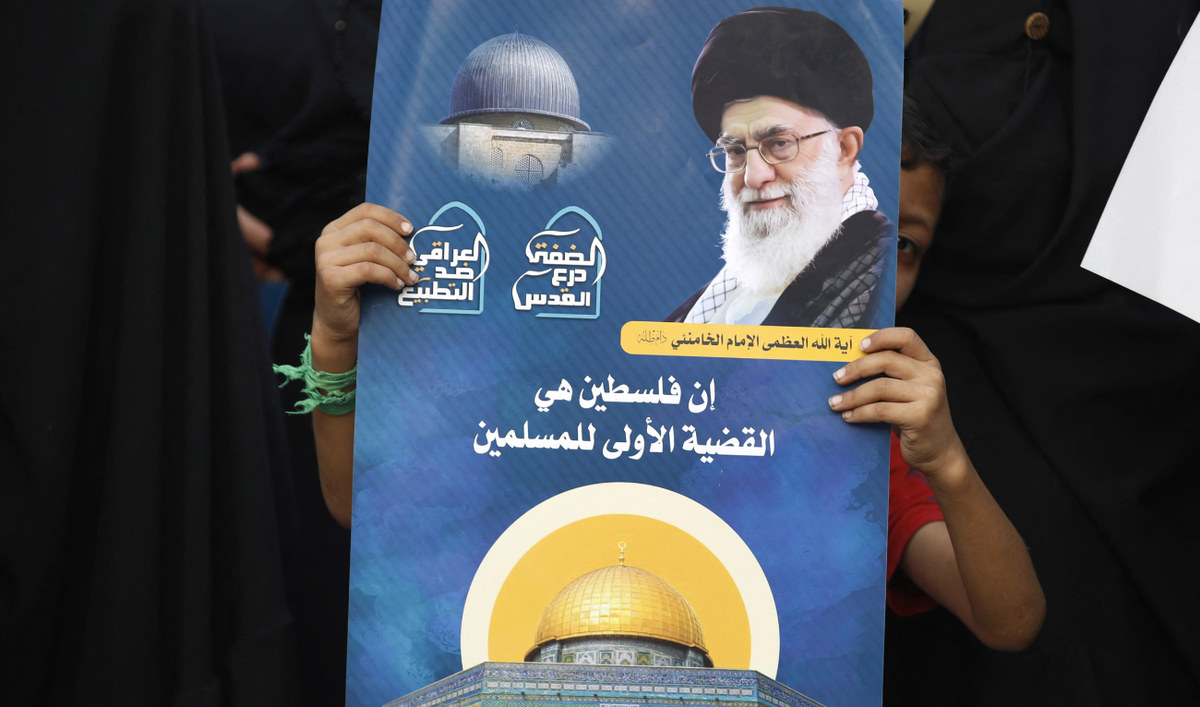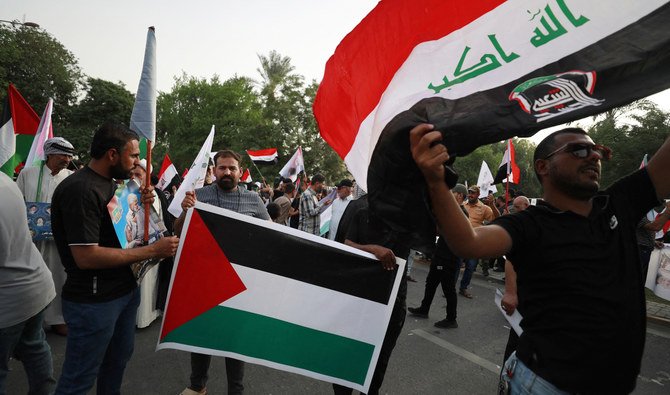- American troops in Iraq and Syria have already come under militia attack, prompting retaliation
- Iraq’s PM Al-Sudani has condemned attacks, but analysts question his ability to restrain armed groups
IRBIL, IRAQI KURDISTAN: With its coffers swelled by high oil prices and a degree of political calm, Iraq looks set to enjoy a period of stability not seen in decades. However, the Israel-Hamas war that began in early October could jeopardize all this, especially if it inflames the sensitive regional situation and escalates into a wider conflict.
Various Iran-backed militias across the Middle East have threatened to attack American interests in the region if Washington becomes openly involved in Israel’s ground war against Hamas in the Gaza Strip. These militias have already attacked bases hosting American troops in Iraq and Syria with rockets and drones in recent days.
In an analysis for the Arab Center Washington DC, Rend Al-Rahim, a former Iraqi ambassador to the US, wrote: “In the space of just over two weeks, Israel’s war on Gaza has upended Iraqi Prime Minister Mohammed Shia’ Al-Sudani’s year-long careful balancing of Iraq’s foreign relations and his efforts to maintain stability in Iraq.”
The US has ordered the departure of its “non-emergency” personnel from Iraq and warned Americans not to travel to the country due to the elevated threat level. The UK has also temporarily withdrawn staff from its embassy in Baghdad and advised Britons against all travel to Iraq, aside from strictly essential trips to Iraqi Kurdistan.

An estimated 2,500 US troops are at present based in Iraq under authorization from Baghdad, advising and training Iraqi and Kurdish forces in their ongoing fight against Daesh. Another 900 are deployed in northeast Syria, partnered with local Kurdish-led forces in their own fight against remnants of the extremist group.
Since Oct. 17, US troops have come under rocket and drone attack at Iraq’s western Ain Al-Asad airbase, Iraqi-Kurdistan’s Harir airfield, and southern Syria’s Al-Tanf garrison. Twenty-one US personnel suffered “minor injuries,” but were able to promptly resume duties, while one civilian contractor died after suffering a cardiac incident during one of these attacks.
On Thursday, the US launched “precision self-defense strikes” against two facilities in eastern Syria used by Iran’s powerful Islamic Revolutionary Guard Corps and its local affiliates. Lloyd Austin, the US defense secretary, described the strikes as a response to “a series of ongoing and mostly unsuccessful attacks against US personnel in Iraq and Syria by Iranian-backed militia groups.”
These groups, including Kataib Hezbollah, Asa’ib Ahl Al-Haq, and others, have threatened to step up attacks if Israel launches a major ground war against Hamas in Gaza, increasing the risk of US troops being severely injured or even killed and raising the possibility of the US military retaliating more forcefully. Such an escalation could potentially ignite an uncontrollable conflagration that could plunge Iraq back into chaos and war.
Al-Sudani has condemned the recent attacks on US troops in Iraq, branding them “unacceptable,” and has ordered state security forces to pursue the perpetrators.

Many of the Iran-backed militias in Iraq are part of the country’s state-sanctioned paramilitary Popular Mobilization Forces, or PMF, some of whose leaders are in Al-Sudani’s government. Despite this, Al-Sudani has little to no control over these armed groups.
“Reports are that he (Al-Sudani) warned the pro-Iran groups that if they get directly involved in Gaza, the US and Israel would retaliate against them in Iraq,” Joel Wing, author of the blog, Musings on Iraq, told Arab News. “Other than that, he is powerless to constrain them.”
Indeed, shortly after the Israel-Hamas war began, Iraqi politician Hadi Al-Amiri, leader of the Iran-linked Badr Organization, which constitutes a large part of the PMF, said: “If they (the US) intervene, we would intervene … we will consider all American targets legitimate.”

Ryan Bohl, a senior Middle East and North Africa analyst at the risk intelligence company RANE, similarly believes Al-Sudani’s government would “largely be a bystander” in the event of a significant escalation, with Tehran and Washington “driving events on the ground” rather than Baghdad.
“Iraq’s diplomatic maneuvering is likely to remain very critical of Israel and even the US at times, though it doesn’t yet seem like it’ll push US troops to leave the country,” Bohl told Arab News.
INNUMBERS
- 42m Population of Iraq.
- 11m Size of labor force.
- 14.19% Total unemployment rate.
- 27.2% Youth unemployment rate.
- 27% Public debt as a percent of GDP.
One powerful Shiite figure and militia leader who has repeatedly clashed with pro-Iran factions in Iraq is Muqtada Al-Sadr, who has already brought his followers out in force to condemn Israel. Analysts believe he may seek to leverage the present crisis to reenter politics and challenge his Iran-backed rivals.
Wing says Al-Sadr, like other political leaders in Iraq, is “hoping to exploit” the crisis in Gaza for his own ends. Indeed, the street protests he has organized in recent days potentially mark the beginning of a campaign ahead of elections in December.
Bohl agrees it seems likely that Al-Sadr will use the crisis for “at least marginal political gain.” However, he is unsure whether the issue will bring Al-Sadr back into politics since the “factors that drove him out” in the first place have nothing to do with the Israeli-Palestinian conflict.
“On the other hand, if there is a major regional escalation that involves Iraq, Al-Sadr could be one of the Shiite politicians Iraq would look to for leadership as it accounted for how the country was pulled into the conflict to start with,” Bohl said.

The risk of a broader conflict is considerable. Wing says some Iraqi groups are already discussing “escalating their ongoing attacks” if a ground war begins in Gaza. He predicts such an escalation would “probably mean rocket and drone strikes on the US embassy” in Baghdad.
“I’ve read that factions are split about whether to get directly involved in the conflict. And if they did, it would be with Hezbollah in Lebanon and not with Hamas in Gaza,” he said.
Bohl believes that while it remains a “potent possibility” that an Israeli ground incursion into Gaza could result in significant instability in Iraq, “there are different drivers to consider.”
“If such militias escalate against the US too much, they could trigger a regional US reaction to Iran and its proxies that would not be in Iran’s interest,” he said.
“I largely expect they’ll engage in harassment and one-off attacks rather than mass attacks designed to cause significant casualties.”

Both analysts believe the latest attacks are intended to demonstrate the capabilities of these militias to strike US forces rather than to actually inflict casualties on them.
Wing summed up the current attacks as “completely symbolic,” explaining that if these militias wanted to launch “real assaults to do damage,” they would “use dozens of rockets and drones.”
“The ongoing attacks are just shooting a few rockets and using one, two drones,” he said. “If they caused some serious US casualties, Washington would retaliate, and I don’t think the Iraqi factions want that.”
For Bohl, these are “harassing attacks on US targets designed to gain political legitimacy and signal to the US and Israel the risks of escalation by their side.”

In February 2021, a militia rocket attack targeting the American base in Iraqi-Kurdistan’s Irbil International Airport killed a civilian contractor. The US retaliated against Iran-backed militias in Syria instead of Iraq, likely to avoid destabilizing the situation in Iraq through tit-for-tat exchanges of fire.
It is unclear whether that was the goal of Thursday’s retaliatory strikes in Syria or if the US would consider retaliation within Iraq in the future.
“I think it completely depends upon the situation, such as where the attack takes place and the nature of the US casualties,” Wing said. “The bigger the death toll of US soldiers, the bigger Washington’s response will be.”
He added: “If a lot of Americans get killed, you could expect US retaliatory strikes across Syria and Iraq. If one or two get killed, the US would probably hit an ammo dump of some Iraqi faction.”

Bohl also believes future US retaliatory strikes will “remain proportional and focused on the origins of the attacks” rather than “a comprehensive campaign” targeting Iran’s proxies across the region.
“But this would change if the US believed Iran was preparing for a region-wide escalation, at which point the US would likely try to prevent such an escalation with a more thorough pre-emptive campaign.”
Looking to the future, Al-Rahim, the former Iraqi diplomat and analyst, said: “What is certain is that the renewed strength of hardliners in Iraq will translate into increased Iranian interference in the country’s internal affairs and foreign policy choices.”
She expects Tehran’s regional calculations to “determine the scope and modality of belligerence by its Iraqi allies, leading to greater pressure” on Al-Sudani and his government.
Source: Arab News



